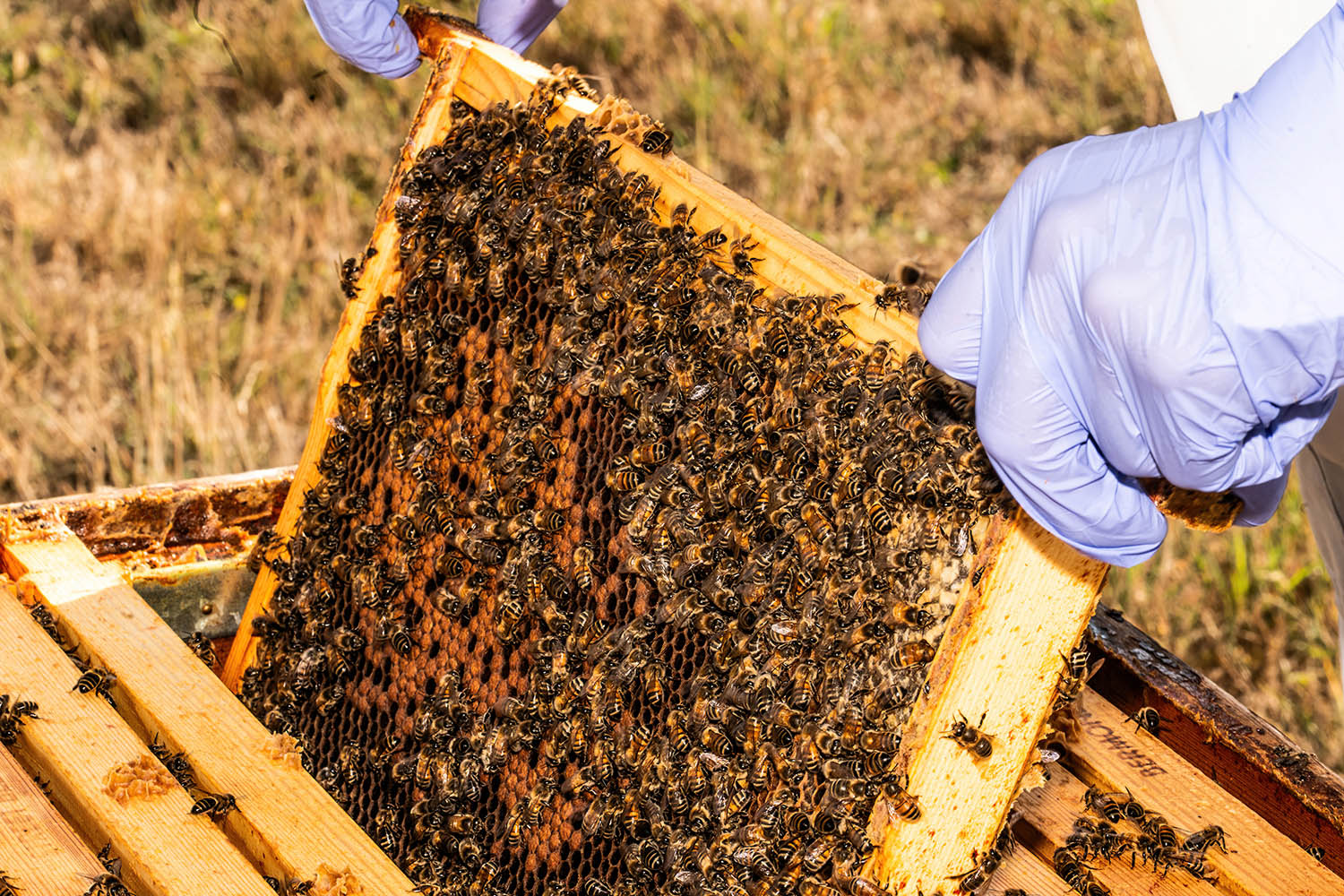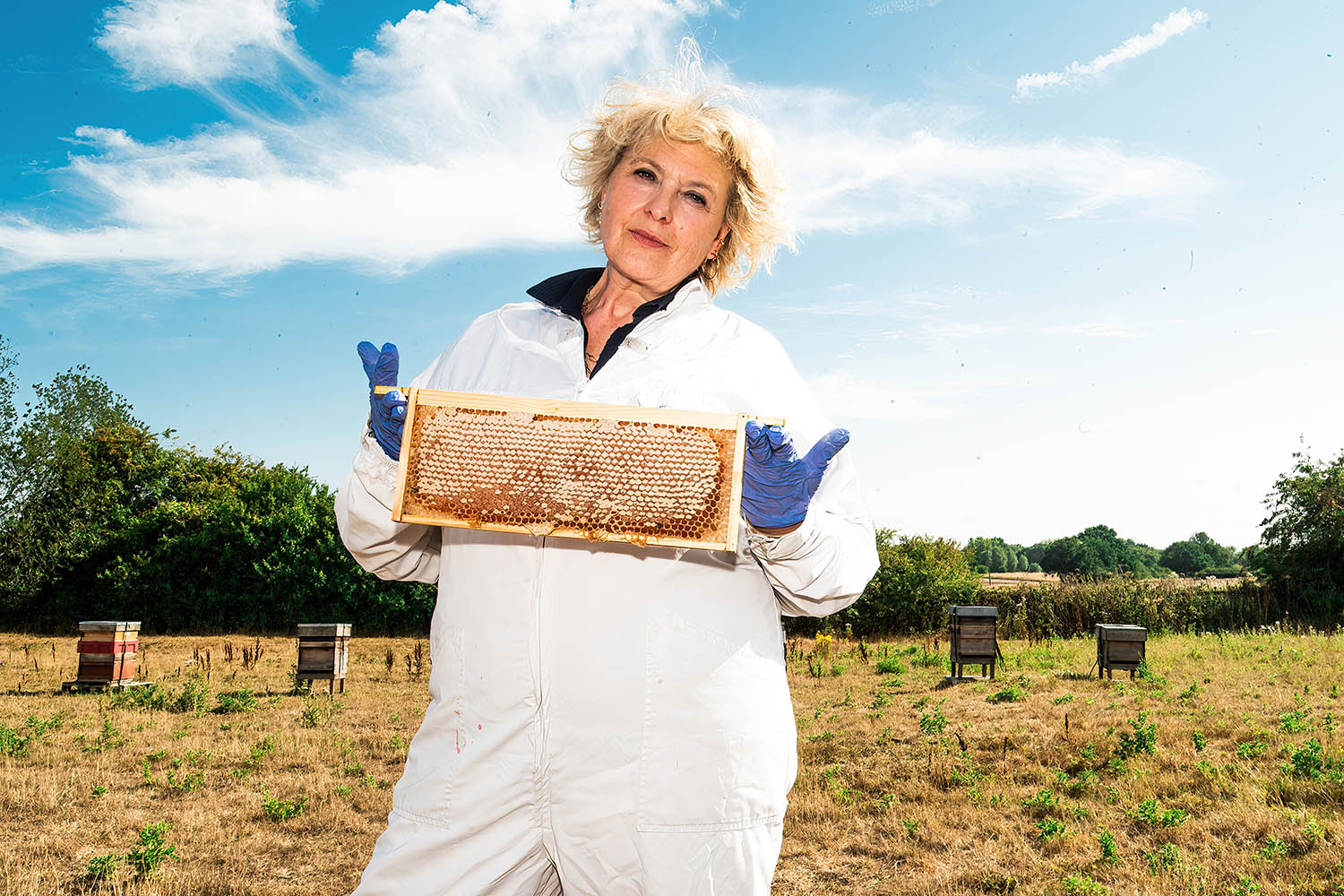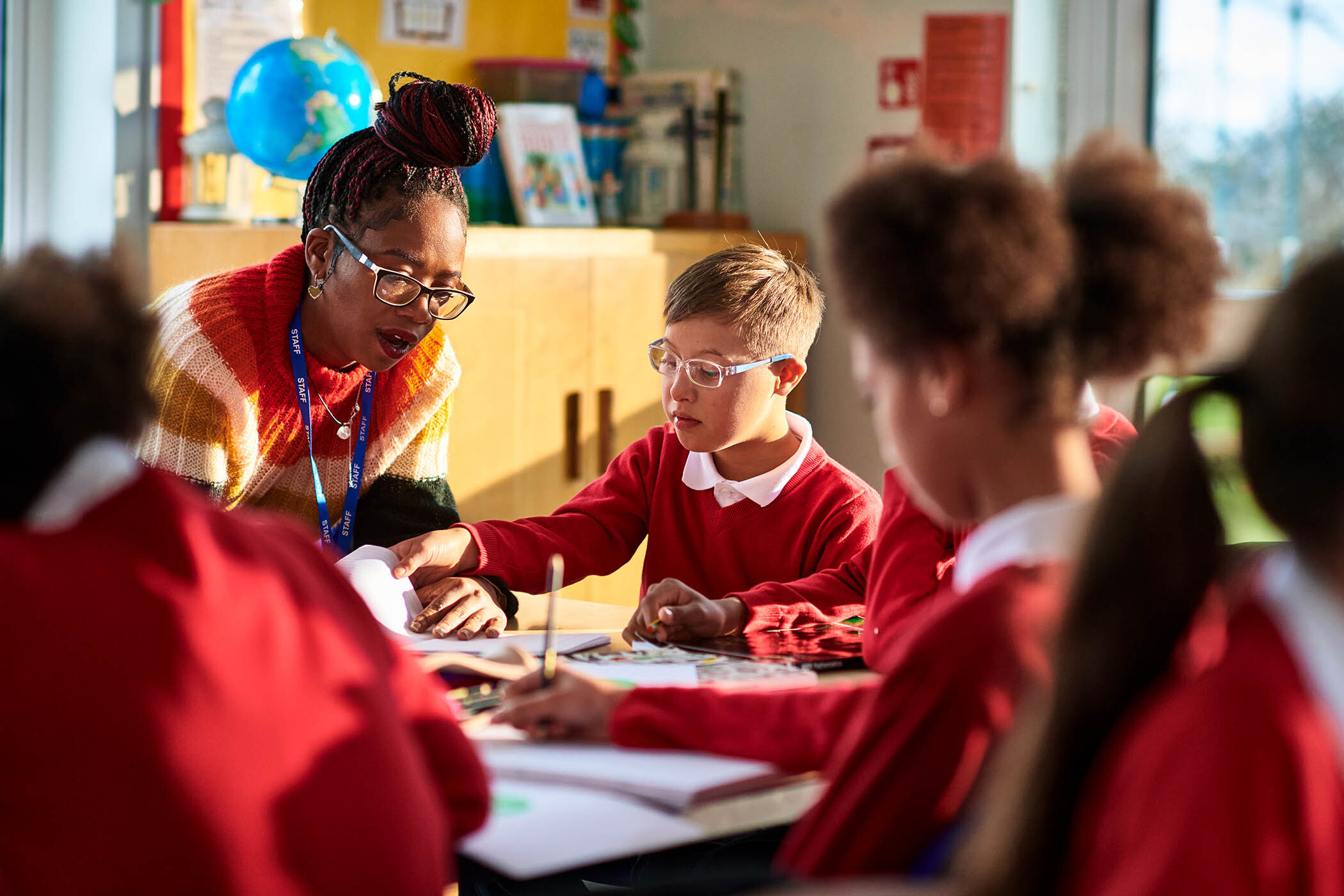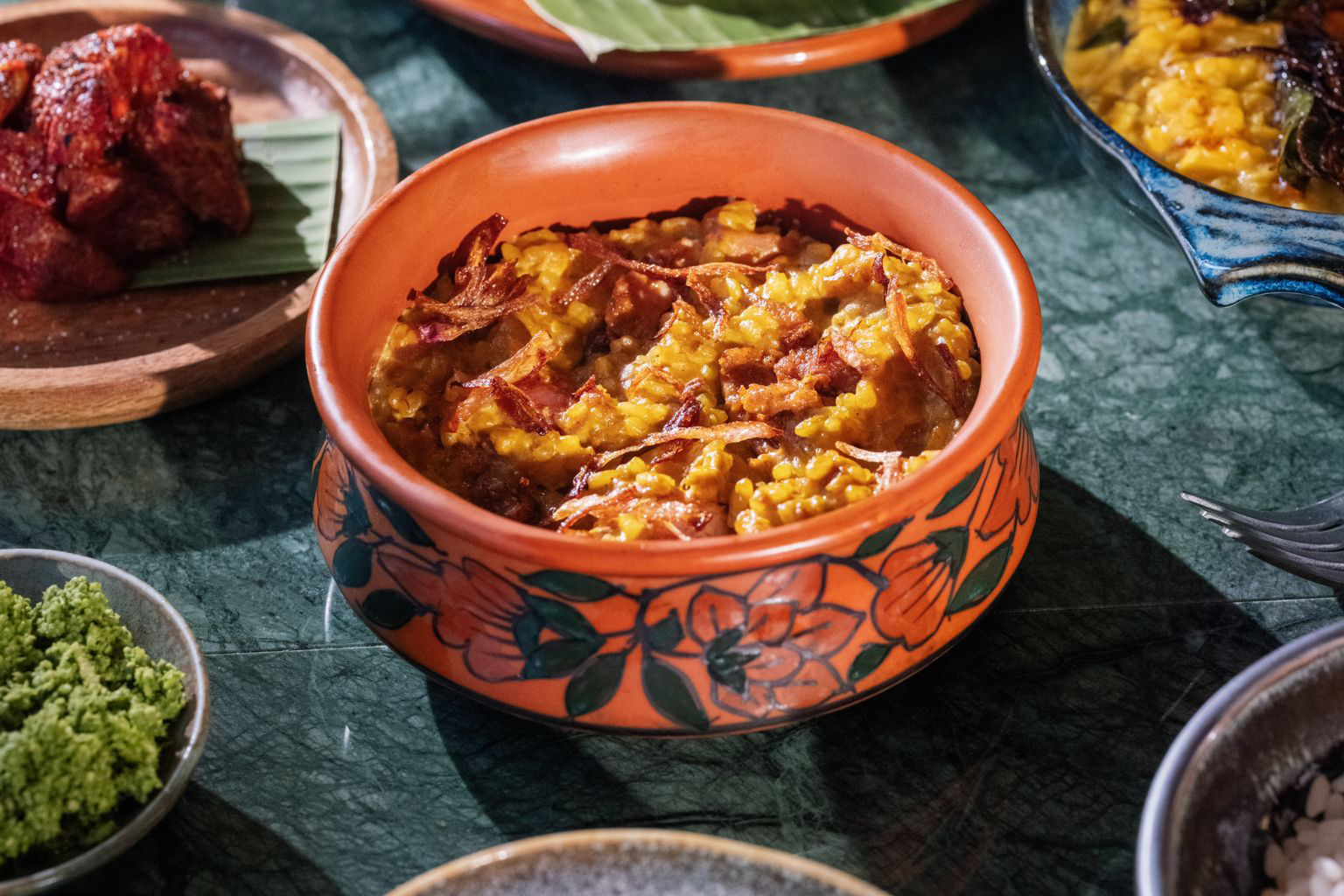You can listen to Jon Ungoed-Thomas’s investigation on this week’s episode of The Slow Newscast, The great British honey scandal, here.
It’s like a fine wine, says Sarah Wyndham Lewis, sitting at a table at her home in Essex, describing the complexity and depth of taste of real honey.
A good honey has its own terroir, she adds. “We’re looking at about 200 substances in honey, and they are responsive to the soil, the weather and the prevailing conditions … You’ve got this extraordinary potential for limitless variety.”
Wyndham Lewis is a honey sommelier and co-founder of Bermondsey Street Bees, supplying restaurants with raw honey and training food professionals to use it. She believes, too, in educating everyone about the watery, blended “anonymised sugary concoction” found on the shelves of some British supermarkets.
It is not just a question of taste; many beekeepers believe that honey is at the heart of one of the world’s biggest food frauds, and that some, including jars sold in the UK, is blended with cheap sugar syrup from China, allowing it to be sold at a much lower price. “We’re hiding some very dirty secrets here,” says Wyndham Lewis. “Nobody wants to tackle it.”
Britain is the world’s biggest importer of Chinese honey. In the coastal provinces of eastern China, sprawling factories heat, blend and pack jars of one of the world’s most traded commodities. The region is also a hub for the manufacture of fructose syrup, which can mimic the taste of honey and pass some authenticity checks.
UK regulators have been accused of being “supine” in the face of a huge and largely undetected global fraud. Under current rules, a blend of honeys from different countries does not require those countries to be listed on the label. Last year, beekeepers attending a food fair in Paris secretly recorded sales teams from east Asia claiming the UK was targeted with the cheapest honey because of a lack of robust and effective testing.
The Observer has obtained and analysed more than 500 authenticity laboratory test results conducted on UK supermarket honey since 2018, commissioned by beekeepers and fraud investigators. They reveal how some of the country’s bestselling honeys have repeatedly failed tests to detect sugar syrups used to bulk out products.
Importers have challenged the reliability of these tests, but in 2023 the European Commission published its own. These revealed that 147 out of 320 samples from across Europe were considered suspicious, because of at least one marker of “extraneous sugar sources”. All 10 samples blended or packaged in Britain, but likely to have originated overseas, failed the tests.
A clue can be found in the price tag, Wyndham Lewis says. Some supermarket own-brand honey sells from as little as about 80p. “[It’s] sold at a price point which will tell you immediately that it cannot be real honey because nobody could produce it at that price. They’re asking people to buy a product which has no traceability at all.”
Her husband, Dale Gibson, co-founder of Bermondsey Street Bees, says these jars are unrecognisable as honey. “A proper honey production person cannot make any money at that price,” he says. “You can't really even buy the jar for that price if you're a small producer, let alone fill it with honey, label it, transport it [and] all the other things you'd have to do.”
Honey is rich in antioxidants and has been used for medicinal purposes since ancient times, with research suggesting it may possess anti-inflammatory properties. It matures in the hive to create one of the world’s most complex natural sweeteners, containing tiny amounts of vitamins, minerals and enzymes. Cheap sugar syrup lacks the range of the nutritional benefits honey can provide.

China exported more than 169,000 tonnes of honey last year, more than 47,000 of which were sent to the UK. Germany imported fewer than 2,500 tonnes in 2024.
Bernhard Heuvel, a commercial beekeeper from Germany and president of the European Professional Beekeepers Association, flew to Shanghai in May to visit one of the global hubs of honey production, fitted with secret filming and recording equipment. He claims so much of the honey supply chain is bulked out with syrup that prices have collapsed, driving beekeepers out of the business.
Cheap sugar syrup is marketed with claims it can beat most standards tests used to authenticate honey. Chinese authorities are keen to protect the world’s biggest honey industry, but the bioengineered syrup is sold in vast plastic drums for as little as 75p a kilogram and flows largely undetected into the supply chain.
“We were secretly filming [for a German documentary] the business dinners and also negotiations,” says Heuvel. “Factories we were visiting had containers of the syrup and the honey. Factories were telling us to import it to Europe and mix it. “They were saying to us: 30-40% syrup is no problem with any kind of quality of honey. The higher the quality of honey, you can go up with the syrup.” Even a blend of 90% bioengineered syrup and 10% honey can pass some widely used tests, he adds.
On Mexico’s Yucatán peninsula, beekeepers have seen the price of their produce collapse, and blame adulterated Chinese honey. In 2018, they sent a representative to the UK to buy a range of honeys and send them to an accredited German lab for testing. Ten of 11 jars – including own-brands from some of the UK’s biggest supermarkets – failed the most advanced authenticity tests, called nuclear magnetic resonance. None passed all the authenticity tests.
“We didn’t expect to find that all the samples were fake,” says Arturo Carrillo, who lives in Mexico and is coordinator of the Honey Authenticity Project. “That was very shocking because we realised the magnitude of the problem in the UK.”
Carrillo said he had been confident there would be an investigation once official tests suggested fraud. “Nothing happened for months,” he says. “It was very disappointing.”
The Mexican complaints were sent to trading standard authorities in areas where the honeys had been bought. Most did not respond, but one council commissioned its own tests on a Tesco own-brand set honey. In 2019, the public analyst reported that “the results of this analysis showed the presence of numerous marker compounds found in sugar syrups and was therefore consistent with the addition of sugar syrup”.
‘Nobody could make honey at that price. They’re asking people to buy a product with no traceability at all’
‘Nobody could make honey at that price. They’re asking people to buy a product with no traceability at all’
Sarah Wyndham Lewis
The honey importers and the national food watchdog dispute the reliability of the tests. In November 2020, the UK’s Food Standards Agency (FSA) concluded: “We considered all available evidence regarding the authenticity of this honey, including extensive traceability records. We were satisfied that no further action needed to be taken.” Tesco said its honey was “100% pure” and could be traced back to the keeper but recognised a more transparent honey testing regime was required.
UK regulators say results suggesting possible adulteration do not conclusively prove fraud but are a red flag for further investigation.
A government spokesperson said: “We take any type of food fraud very seriously. We work closely with enforcement authorities to ensure that food sold in the UK is not subject to adulteration, meets our high standards – and maintains a level playing field between producers.”
The FSA has limited resources and prioritises products in the food chain that pose a risk to health. There is also no agreement in the industry or among regulators on a single test that could establish whether honey is adulterated, meaning it is laborious and costly to try to uncover the supply chain of fake honey. European regulators, however, have been more determined. In March 2023, an investigation called From the Hives found the highest number of suspicious honey consignments were from China (66 out of 89). In the EU, 44 operators were investigated and seven were sanctioned.
The EU has since introduced rules to require producers to label jars of blended honey with the countries of origin from June 2026. The UK is considering similar rules. The EU has also set up a project to improve testing, with a view to establishing a reference laboratory, and proposals for a traceability system.
A spokesperson for the Honey Association, which represents UK importers, said it considered the 2023 European Commission report to be “biased and questionable”. They added: “Leading experts in the UK, who have spent decades specialising in honey testing, have suggested to us that to date they have seen no credible scientific evidence suggesting that honey fraud or adulteration is a widespread issue in the UK.”
The British Retail Consortium told The Observer that retailers had tightened checks and were “working closely with the Food Standards Agency and the food crime unit to tackle fraud in honey”. But the scale of the fraud has been highlighted by the congress of the International Federation of Beekeepers’ Associations, also known as Apimondia, which will be held in Copenhagen next month. For the first time in its history, it will not award a best honey prize because of the challenge of it being “fully tested for adulteration”.
Adrian Charlton, principal scientist at Fera Science, a UK research organisation that provides honey testing, says more investment is needed to validate testing methods for honey. “We don’t have the tools to unequivocally prove whether there’s fraud or not.”
The C4 test, the most commonly used check in the UK, can easily be beaten by fraudsters. Charlton believes a “weight of evidence” approach is required, using various tests and supply chain documentation. No single test can be definitive, says Rick Mumford, FSA’s head of science and research. “The FSA, the Department for Environment, Food and Rural Affairs, and the government chemist have worked closely together to develop practical methods for improving authenticity testing, including a weight of evidence toolkit and honey sampling protocol.
“As honey is a complex natural product, new techniques and tools are being developed to help businesses, government and enforcement agencies tackle honey fraud now and in the future, so consumers can have greater confidence in what they are picking up in their weekly shop.”
But a clue to authenticity to what they’re buying can be found in the price tag, says Wyndham Lewis. Some own-brand honey sells for 80p, “that will tell you immediately it cannot be real honey because nobody could produce it at that price. They’re asking people to buy a product which has no traceability at all.”
The science
One of the most widely used authenticity tests is called the C4 sugar test (also known as AOAC 998.12), which is designed to detect syrups from plants such as maize and sugar cane. Sugar molecules in these syrups come from C4 plants, so named because the first organic compound synthesised during photosynthesis contains four carbon atoms, while nectar typically collected by bees comes from C3 plants.
The fraudsters carefully formulate syrup to beat the C4 sugar test using syrups more closely resembling the composition of honey. More sophisticated tests have been developed, but over the years a race between fraudsters and government watchdogs in honey laboratories across the world has seen the regulators falling behind.
Photographs by Sonja Horsman/The Observer
Newsletters
Choose the newsletters you want to receive
View more
For information about how The Observer protects your data, read our Privacy Policy



